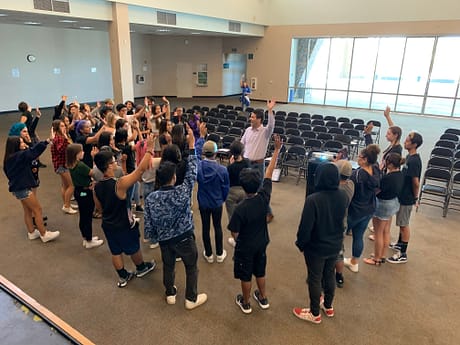 In June, I was privileged to spend time working with talented young musicians at a band camp. They nervously filed in for the first rehearsal, not sure what this “Army guy” would be like. As they opened their folders for the first look at music we would be performing a few days later with only seven hours of total rehearsal. The numerous All-State musicians in the group probably saw a difficult set of pieces but weren’t intimidated by it. The over 50% of the band who were not all-staters, many from small schools, looked like they were going to pass out! We started to rehearse, and my experience told me we would make it if we worked hard. But many of the students didn’t have that confidence and it was, frankly, a rough morning, and there were a lot of discouraged faces.
In June, I was privileged to spend time working with talented young musicians at a band camp. They nervously filed in for the first rehearsal, not sure what this “Army guy” would be like. As they opened their folders for the first look at music we would be performing a few days later with only seven hours of total rehearsal. The numerous All-State musicians in the group probably saw a difficult set of pieces but weren’t intimidated by it. The over 50% of the band who were not all-staters, many from small schools, looked like they were going to pass out! We started to rehearse, and my experience told me we would make it if we worked hard. But many of the students didn’t have that confidence and it was, frankly, a rough morning, and there were a lot of discouraged faces.
After some sectionals and lunch, we began again. At one point, a musician raised her hand and said, “I just don’t know what you’re doing.” Instead of dismissing her concerns, I asked more questions and realized I had not brought them “inside.” I didn’t have a band in front of me, but a group of leaders. They wanted to do well but weren’t going to buy in just because I had a baton.
I shared with them and showed the difference between “floor, wall, wall, ceiling” time beating and showing musical lines. I acknowledged they were most comfortable with time-beating but asked if they’d be willing to try to go farther. Finally, I promised them I would not let them sound bad. If they needed nothing but a clear beat pattern, they’d get it but if we (not I) felt we could take some musical risks, we’d do it together. From that point on, not only did they play better, but there was also lots of dialogue during and after rehearsal. They were all treated like leaders, and they assumed the responsibility for their musical program.
In this issue, Dr. Matthew Arau offers thoughts on inclusive student leadership where leaders are not just those with formal titles. In Windtalkers, Dr. Christine Carrucci talks about affective student learning where we bring students to a higher learning plane than just getting the notes and rhythms correct. Finally, our publisher Mike Lawson shares an amazing experience he had with composer Robert W. Smith at Universal Studios.
Thanks to the musician who said, “I don’t know what you’re doing.” Without her little act of bravery, I might well have missed out on the opportunity to not just lead a band, but to work with colleagues!








